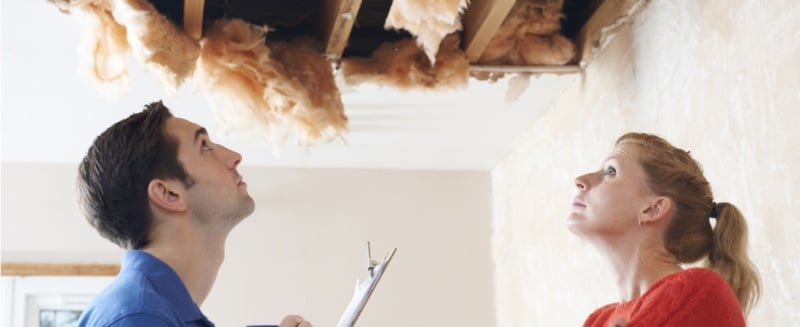When a lack of seller disclosure and a bad home inspection collide, it causes expensive problems for these buyers. Here are a few suggestions for how they can move forward.
Q: What are sellers required to disclose to buyers? We recently purchased a home in Houston, Texas. When we had the home inspected prior to the closing — twice, as it happens — we pointed to this specific crack in the ceiling at which the inspector made the same remark both times: He said it’s just general cracks that happen from weather conditions and movement of the home.
Well we asked the previous owner in a text and he responded that the crack happens about once year and they have been repairing it for 10 years. So we had a frame repair contractor come out. He indicated that the crack is due to a problem with the attic construction. The main beam in the attic — the one everything connects to — does not have a support beam holding it up, to support all the weight of the roof.
Since the previous owner didn’t disclose the problem, and the inspector passed it off as a cosmetic issue, who is to be held responsible? At this point, it will cost us between $5,000 to $7,000 to repair the structure so the crack doesn’t reappear in the future.
A: When it comes to seller disclosure, buyers have to understand some basic truths. Here’s one: The seller only could disclose to you what the seller knew to be true. You asked the seller a question and the seller told you that he repeatedly had a problem and had been repairing the crack for 10 years. From what you have told us, it does not appear that you claim that he lied to you; instead, we think that you’re claiming he knew of the problem and failed to disclose it to you before you bought the property.
There could be a seller disclosure issue, unless the seller believed that the final time he repaired the crack and it was fixed forever or the seller thought it was a cosmetic issue. More on this in a moment.
The question we have is whether the lack of a support beam is critical (meaning, the roof could cave in) or aesthetic (in that it would prevent the cracking). If the issue is aesthetic, you get to decide whether to live with the crack coming back from time to time. However, if the issue is critical, and you must repair the issue to prevent a catastrophic failure in the structure, that is a different story.
If the issue is critical and the seller knew that it was a critical issue and didn’t tell you, you may have a seller disclosure claim against the seller. Seller disclosure laws generally require a seller disclose all material problems that the seller knows that could directly affect the home or the home’s value. If a seller does not know of a material problem, the seller can’t disclose that to you and has no obligation to you relating to that issue.
A good example would be termites in a home. If you sell your home and don’t know your home has termites because they are hidden behind the walls and the buyer later does work in the home and discovers the termite problem, it would be the buyer’s problem. Now, if the seller knew the house had an ongoing termite problem (even if the termites only showed up once a year, but had done so for ten years in a row) and didn’t disclose the issue, then the seller might have liability to the buyer for the problem under seller disclosure laws in most states.
We know your seller knew of a problem with the crack resurfacing on a yearly basis. But from the seller’s point of view, it was a cosmetic issue that he dealt with by painting the spot on a yearly basis. You have not told us anything that would lead us to conclude that the seller knew that the problem was critical and could cause the a collapse. Our hunch is that the seller thought it was a cosmetic issue and so did your inspector.
We suggest you to get a second opinion on the crack to determine whether the crack and support issue are critical or cosmetic. If the issue is cosmetic, then you likely wouldn’t have a claim against the seller or the inspector under most seller disclosure laws. If the issue is critical and requires immediate attention, then we doubt the seller would be responsible unless you could prove they knew that the situation was as critical as you found out later and that they hid that fact from you.
As far as the inspector’s liability is concerned, his level of expertise should be at a level of what most home inspectors would have. It is unreasonable for you to expect a home inspector to be able to see behind walls. If they suspect a more serious problem, the inspector should recommend you talk to a specific expert before deciding to purchase the property.
That means that if the issue you face appeared cosmetic and without further investigation and expertise would not have alarmed the inspector, you might be out of luck there as well. The home inspector can’t know everything but can only use his best judgment to evaluate conditions at the home. If his opinion was reasonable given the situation he saw, you’d probably have no recourse against the inspector. (When faced with an expensive mistake, many the inspector will offer to return the fee you paid. Read your home inspection contract to see what remedies are available to you.)
For more information, we’d suggest you talk to an attorney with experience in seller disclosure issues but only after you’ve figured out if the issue is truly serious and must be fixed.







Leave A Comment